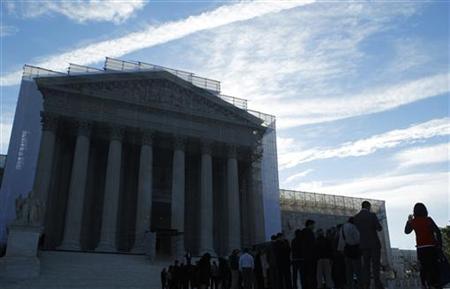TAMPA, Fla. (AP) — Jill Kelley's climb to the top of Tampa's social ladder may be as spectacular as her fall from it.
Accounts
of lavish parties at her bay front mansion with politicians and
military generals have been replaced by reports of her family's
financial woes and other dirty laundry, and claims she used her close
friendship with David Petraeus
to try to further lucrative business dealings. Now, even her "Friends
of MacDill" Air Force base access pass has been unceremoniously revoked.
The tangled web enveloping the daughter of Lebanese refugees, her twin sister, former CIA chief Petraeus, and Marine Gen. John Allen, who succeeded Petraeus as the top American commander in Afghanistan, has spread to include questions about a cancer charity Kelley and her doctor-husband, Scott, founded.
Although
Petraeus' affair with his biographer, Army Reserve officer Paula
Broadwell, was the immediate cause of his downfall, Kelley and her
relations with the Tampa base and the U.S. Central Command have surfaced
as a sort of connective tissue for the growing scandal.
On Wednesday, a New York businessman said Kelley was introduced to him at the Republican National Convention in Tampa in August as someone whose friendship with Petraeus would help facilitate a no-bid deal with South Korea
on a coal-gasification project. She would supposedly be in a position
to help broker the billion-dollar deal directly with the Korean
president, and expected a 2 percent commission, said Adam Victor, president and chief executive officer of TransGas Development Systems.
Kelley
is an honorary consul for South Korea, a ceremonial position, and got
diplomatic plates for her car.
But after flying Kelley to New York to
discuss how she could help, Victor says he concluded she had little to
offer in the way of deal-making expertise or connections with Korean
leaders.
The AP also learned Wednesday that
Kelley attended an FBI
"Citizens' Academy" last year. It was Kelley's complaints to an FBI
agent about alleged threats from Broadwell that led to the general's
resignation last week and has sidelined Allen's nomination to become the
next commander of U.S. European Command and the commander of NATO
forces in Europe.
The agent was Frederick W. Humphries, 47, a
veteran counterterrorism investigator in the Tampa office, and he was
among the FBI employees Kelley met during the academy, which lasted from
Sept. 13 to Nov. 30, 2011, the AP learned.
Both
Petreaus and Allen have been guests at the Kelleys' 5,000-square-foot
home on Bayshore Boulevard, which records show they purchased in 2004
for about $1.5 million. Jill Kelley's twin sister, Natalie Khawam, also lives there.
The
five-bedroom, three-and-a-half-bath brick Colonial with its stately
white columns is on the main parade route for the Gasparilla Pirate
Festival, Tampa's answer to Mardi Gras. And the couple soon gained a
reputation for their sumptuous and well-attended affairs. Jill Kelley, 37, and her husband — a cancer surgeon — are members of the Tampa Yacht and Country Club.
The
relationship between the Kelleys and Petraeus began in late 2008, when
he came to MacDill to assume command of CENTCOM. The couple threw a
welcome party for him, and he reportedly watched his first Gasparilla
pirate parade from the Kelleys' lawn.
Kelley's overtures to the
military brass are, in and of themselves, nothing extraordinary. In
fact, most of these civilian-military relationships begin innocently
enough. For instance, the connection of another local couple, John
and Leslie Osterweil, with MacDill and CentCom started more than two
decades ago, when a teacher at their son's exclusive prep school asked
him to take a general's boy "under his wing." That boy's father was then
CentCom commander in chief, Gen. Norman Schwarzkopf. Since then, John
Osterweil has become a regular presence on the base. He counts Allen and
Petraeus as close friends, and each has visited the other's home.
"You
know, a lot of people are enamored by people who are high-ranking
generals and admirals," he says. "I mean, a lot of people look at them
in some type of a different light. I look at them as nice people that
are my friends."
But Petraeus aides say J
ill Kelley took it to
another level, winning the title of "honorary ambassador" for her
extensive entertaining at her home on behalf of the command, throwing
parties that raised her social status in Tampa through the reflected
glow of the four-star general in attendance.
Petraeus honored the
couple with an award, given to them in a special ceremony at the
Pentagon just before he departed the military for his post at the CIA,
an aide said, speaking on condition of anonymity because he was not
authorized to comment on the matter publicly.
Aaron Fodiman, who's
been publisher of Tampa Bay Magazine for 27 years, said people like
Petraeus and Allen usually don't know anyone when they arrive, and that
people like Kelley act as "the welcome wagon." But while he described
the hostess as "outgoing and effervescent," he said her parties "were
like everybody else's parties."
"Nothing different or special,"
who has attended several events at the Kelley home. "Standard procedure.
Have a caterer. Feed people. Give them something to drink. And let them
mix."
But behind the scenes, this veneer of upward mobility was showing signs of cracking.
Hundreds
of pages of court files in numerous cases portray the occupants of 1005
Bayshore Boulevard as both litigious and financially strained.
The
Kelleys' investment in a Tampa office building went sour when a
$28,000-a-month tenant balked at payment because of problems with the
air conditioning system. The couple later defaulted on the mortgage and
the property went into foreclosure.
An
attorney who represented the Kelleys in that case, Barry Cohen,
ultimately became the target of a lawsuit over his legal fees. Chase
Bank sued Scott Kelley over a $25,880.56 unpaid credit card bill.
Meanwhile, Khawam, Kelley's twin, has had legal troubles of her own. She sued Cohen's firm, where she was an attorney, claiming sexual harassment by the chief financial officer.
In
court responses, Cohen said Khawam "has a judicially documented recent
history and continuing propensity for the commission of perjury." He
cited a court filing in the District of Columbia that described Khawam
as having a "willingness to say anything, even under oath, to advance
her own personal interests at the expense of ... others."
Khawam, who earned $270,822 in 2010, according to a court filing, has filed for bankruptcy. During
a news conference Wednesday, Cohen said both sisters had been heard
dropping Petraeus' name often, though he never heard Allen's name
invoked. He said both subscribed to the idea that you should "join these
clubs and have these parties and drop these names." Referring to Jill Kelley, he said: "She does what she thinks is necessary to be perceived as being important."
Her apparent importance and connections were described to Victor, when the New York businessman was introduced to her.
"We
went down to the convention to spread our message about coal
gasification and I met someone who seemed to be very well connected in
Tampa" — and was described as a friend of Petraeus and someone who could
deal with the president of South Korea.
In
an interview, Victor continued: "It was Jill Kelley. She was a very
vivacious woman. She seemed eager to assist us in our project and she
confirmed that she was very close to Gen. Petraeus ..."
Victor
said she talked about helping with a non-competitive bid. "And so that
if the (South Korean) president liked it, as a favor to Gen. Petraeus,
there would be one no-bid contract. Every developer likes a no-bid
contract, or sole source. This certainly seemed worthwhile pursuing."
Victor
said his company flew Kelley to New York, first class, for meetings,
and then she flew to Hawaii, allegedly for meetings on the deal. They
discussed her compensation, Victor said. "I said, 'what do you think a
fair fee would be?'" And she emailed me back, 2 percent of the deal,"
which he said could have amounted to tens of millions of dollars.
The
company decided to work through others on the deal. "We decided that
she simply was not a skilled negotiator in these large projects, she's
never been in these large projects and I sort of felt that I wasted my
time," Victor said.
In 2005, the Kelleys established Doctor Kelley
Cancer Foundation Inc., with themselves and Khawam as its sole
directors, according to the Florida Department of State. Its mission
statement says the organization, which was based out of the Kelley home,
was created to "conduct research studies into efforts to discover ways
to improve the quality of life of terminally-ill adult cancer patients."
In
2007, the last year for which it filed paperwork, the foundation
reported revenues of $157,284 to the Internal Revenue Service, all from
direct donations, according to its tax filing. The document lists
expenses totaling precisely the same amount, including $43,317 for meals
and entertainment, $38,610 for travel, $25,013 in legal fees, $8,067
for supplies and $5,082 in phone bills.
The filing claims $58,417 of its expenses went toward program services, but it's unclear what those services entailed.
Christopher
Pietruszkiewicz, dean of the Stetson University Law School and expert
on nonprofits and taxation, said the foundation's filing "raises a lot
more questions than it does provide answers."
"I'm not sure that
we can come up with any conclusions about how the money was spent by the
organizers of the charitable organization, but it does give us a sense
about how $157,000 was spent," he said. "And I do think it raises some
issues that either the Internal Revenue Service or the State of Florida
may be interested in looking at."
The Tampa Bay Times reported
Wednesday that as late as February 2010, Jill Kelley was soliciting
contributions in the foundation's name to fund a dinner for the
homeless. The paper cited an email in which she asked prospective donors
for "in kind' donations (i.e. more food, drinks, banners, decorations)"
and noted that the charity was a "tax write-off."
As the Pentagon
looks into up to 30,000 pages of emails and other documents — some
characterized as "inappropriate communications" — between Jill Kelley
and Allen, MacDill's commander on Tuesday revoked her access pass.
Kelley
was issued the pass, one of about 800 handed out under a program to
promote interaction with the civilian population, in November 2010,
according to a military source, who spoke on condition of anonymity
because the person was not authorized to comment on the situation. It
was renewed this past February.
Several months ago, Jill Kelley
was appointed an honorary local consul for South Korea, said Kristen
Smith, executive assistant at the South Korean consulate in Atlanta,
which also covers Florida. The license plate on Kelley's silver
Mercedes-Benz reads, "Honorary Consul 1JK."
Smith was not
authorized to say anything more about Kelley's activities on that
country's behalf, although she confirmed that Kelley still maintained
her position. When Kelley called police Tuesday to complain of reporters
staking out her home, she cited her honorary position and requested
"diplomatic protection."
During last year's FBI citizens academy,
which Kelley attended, Natalie Shepherd, a reporter with Channel 8 in
Tampa, was one of two media representatives also invited. Among the 30
people on the list was the head of the host committee for the Republican
National Convention, a vice president of security for Walt Disney
Corp., and the Hillsborough County tax collector.
"She's the only person on the list who's just listed as her name," Shepherd said.
Each
Tuesday evening session at the local field office covered a different
topic, such as domestic terrorism, international terror or cybercrime.
Shepherd said agent Humphries led one talk about Afghanistan.
Shepherd recalled Kelley as attentive and inquisitive, but otherwise low-key — especially given recent revelations.
"She
wasn't dropping names or alluding to those connections at all," she
said. "She seemed like one of the normal people in the class."
The FBI did not immediately return a call requesting information on Kelley and the class.
Frodiman,
the magazine publisher, said there's a sense that Kelley's many efforts
to rise socially have been undercut by the scandal.
"I think she
has now been tainted," he said. "Just too much has come out, that even
if it's not true, people will remember. I would imagine that they will
ultimately leave the community."
___
Cassata
reported from Washington. Also contributing to this report were
Associated Press writers Matt Sedensky and Tony Winton in Tampa, and
Adam Goldman in Washington.













